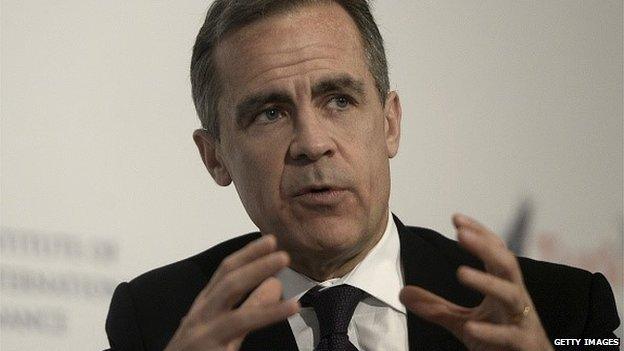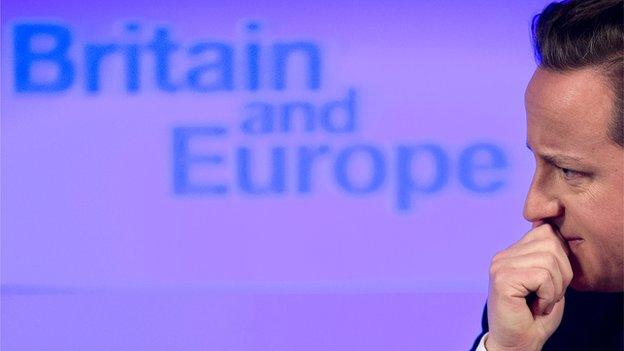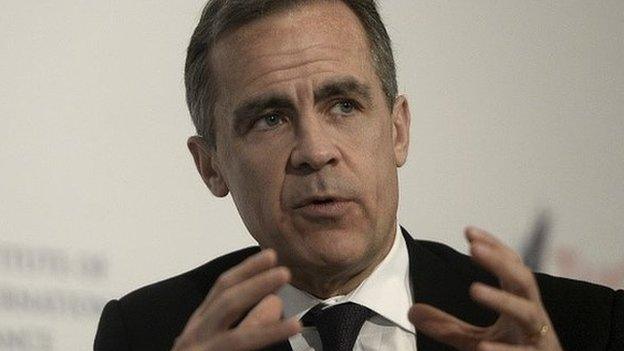EU referendum should be held 'as soon as necessary', says Mark Carney
- Published

Bank of England governor Mark Carney has said that the UK should hold its EU referendum "as soon as necessary".
"We talk to a lot of bosses and there has been uncertainty whether it's for the election or the referendum," said Mr Carney on the BBC's Today programme.
Analysts fear businesses may delay making investments while there is uncertainty over Britain's future in the EU.
David Cameron has promised a vote on whether the UK stays in the EU by 2017.
"[Businesses] have not yet acted on that uncertainty," he said. "Or to put it another way, they are continuing to invest and they are continuing to hire."
But he added that it was in everybody's interests to resolve the uncertainty.
Foreign workers
Companies may also be investing less in technology than they otherwise would do as a result of the wide pool of available workers.
Older people willing to work and workers seeking more hours added 500,000 to the labour force over the last two years, said Mr Carney.
Migrant labour also expanded the workforce, but its impact was only a tenth of the size according to Mr Carney.
Mr Carney told the BBC's Today programme that he would "really dampen down" the argument that foreign workers were to blame for lower productivity.
As the number of jobseekers falls, attention will turn to productivity, he added.
"Now that spare capacity is being used up," said Mr Carney. "For the economy to move forward, it's going to be a story of increased productivity.
"We think that it's going to start to pick up over the next few years."

Analysis: Jonty Bloom, BBC Business Correspondent
British productivity is awful and has been for years.
Take computerised lathes, hi-tech equipment that costs hundreds of thousands of pounds to buy. You might think that British and German workers with such a piece of kit would make the same number of widgets or car parts or whatever.
But they don't. Experts tell me there are two main reasons. German workers are more highly trained, so get more out of the machine. The second is that when it breaks down or needs reprogramming, they can do it themselves. British workers turn off the lathe and wait for an expert to come and fix it.
Just one example of a much wider problem that explains why a German, French or US worker can produce as much as a British one and still take every Friday off.

The UK's level of productivity per worker fell during the global economic crisis.
"This is one of the great costs of the financial crisis," said Mr Carney. "What you have in economies after a financial crisis is a sharp drop in productivity… There is a huge opportunity cost."
Productivity levels have taken longer to recover than expected.
"We have been successively disappointed with the productivity performance of the UK," Mr Carney told the BBC.
"[Productivity] matters in terms of the speed limit for the economy and for when we should raise interest rates," said Mr Carney. "We think the most likely path for interest rates is up."
Mr Carney warned on Wednesday that "persistent headwinds continued to weigh on the UK economy", which would mean more gradual increases in interest rates than had previously been the case.

The Bank of England has said that it may raise interest rates in about a year's time
Inflation was 0% in March for a second month, well below the Bank's 2% target.
Carney said that the UK might fall into deflation next month, but inflation was expected to pick up, notably towards the end of the year.
"Our aim is not just to get the inflation rate back to 2% but to keep it there," said Mr Carney. "In order to get it there and keep it there, there will be limited and gradual increase in interest rates over the next few years."
- Published14 May 2015
- Published14 May 2015

- Published11 May 2015

- Published13 May 2015

- Published14 April 2015
